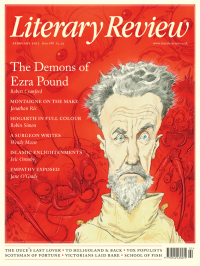Piers Brendon
Portrait of Pum
Gayer-Anderson: The Life and Afterlife of the Irish Pasha
By Louise Foxcroft
The American University in Cairo Press / I B Tauris 248pp £24.95
In 1923 Robert Gayer-Anderson, oriental secretary to the British high commissioner in Egypt, attended the official opening of Tutankhamen’s tomb. The body of the boy-king, who had been mummified with his penis erect, lay in gorgeous state, surrounded by gods and funerary artefacts, among them toy boats from which Gayer-Anderson correctly guessed his age at death – seventeen. The Irish-born empire-builder, who felt he had occult powers and thought himself fated to view an intact pharaonic burial chamber, was awed by the ‘annihilation of time’. And when, soon afterwards, two of his servants were brutally murdered and he himself was nearly assassinated, he wondered if there was any substance to the much-touted curse of King Tut. That aside, the whole experience was a fitting climax to his career as a collector of antiquities and paedophile.
Born in 1881, Gayer-Anderson had an identical twin, Tom, who called him Pum, an unexplained but convenient nickname adopted by Louise Foxcroft in this absorbing biography. Their father, Henry, an erratic, peripatetic and sadistic Irishman who made money as a banker, land speculator and stockbroker, dominated his mild Welsh wife

Sign Up to our newsletter
Receive free articles, highlights from the archive, news, details of prizes, and much more.@Lit_Review
Follow Literary Review on Twitter
Twitter Feed
It wasn’t until 1825 that Pepys’s diary became available for the first time. How it was eventually decrypted and published is a story of subterfuge and duplicity.
Kate Loveman tells the tale.
Kate Loveman - Publishing Pepys
Kate Loveman: Publishing Pepys
literaryreview.co.uk
Arthur Christopher Benson was a pillar of the Edwardian establishment. He was supremely well connected. As his newly published diaries reveal, he was also riotously indiscreet.
Piers Brendon compares Benson’s journals to others from the 20th century.
Piers Brendon - Land of Dopes & Tories
Piers Brendon: Land of Dopes & Tories - The Benson Diaries: Selections from the Diary of Arthur Christopher Benson by Eamon Duffy & Ronald Hyam (edd)
literaryreview.co.uk
Of the siblings Gwen and Augustus John, it is Augustus who has commanded most attention from collectors and connoisseurs.
Was he really the finer artist, asks Tanya Harrod, or is it time Gwen emerged from her brother’s shadow?
Tanya Harrod - Cut from the Same Canvas
Tanya Harrod: Cut from the Same Canvas - Artists, Siblings, Visionaries: The Lives and Loves of Gwen and Augustus John by Judith Mackrell
literaryreview.co.uk